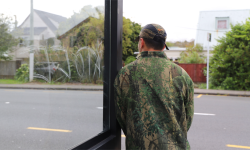
Each time we say the Lordu2019s Prayer, we ask for Godu2019s Kingdom to come. This is not just a prayer of hope for the future, however, but a bold request for the coming Kingdom to change our lives here and now. How can this happen? Greg Liston explains.
As followers of Jesus, our ultimate destination is truly breathtaking. The captivating description of Godu2019s coming Kingdom in Revelation 21u201122 paints a picture of the church as Christu2019s radiant bride, completely united with him. We look forward to a world where every remnant of evil and darkness has been swept away by Godu2019s all-encompassing goodness and light.
It is almost impossible to read these descriptions of the coming Kingdom without a deep sense of longing. Together, we hope for the eventual day when abundant life, truth, justice and love will be our complete and defining reality. Come, Lord Jesus!
But the Kingdom is not just something we wait for. The extraordinary claim made over and over in the Bible is that the Kingdom is already here! How can this be? Through the Spirit, who brings the future back to enrich our present reality. In particular, the Spirit brings back the presence of Christ the King, whou2014at least in partu2014exerts his kingly influence in our churches and lives right now.
Even more than that, the Spirit leads us forward, transforming us into the kind of people who actually belong in this Kingdom. As Paul says, u201cAnd the Lordu2014who is the Spiritu2014makes us more and more like him as we are changed into his glorious imageu201d (2 Corinthians 3:18, NLT).
Preparation and partnership
The important question this raises, though, is how this transformation happens. How does the Spirit transform the church, and how can we partner with the Spirit in this transformation? For our lives are all about preparation. This world is the gymnasium, not the rugby field; it is the rehearsal space, not the concert hall.
Just as the Israelites were led through the desert for 40 years to prepare them to become true inhabitants of the promised land, so we are led through this life to prepare us to become true inhabitants of the coming Kingdom.
Over the last few years, a growing chorus of theologians have claimed that the primary way the Spirit prepares us for the coming Kingdom is through normal church life: gathering, singing, taking the Lordu2019s Supper, hearing Godu2019s Word, and so on. While this has always been the historic Christian understanding, it is worth recognising just how radically different it is from the way we think about church these days.
Ask your average Kiwi Christian why they attend church, and they will (probably) say, u201cto express our devotion and praise to Godu201d. These theologians would reply that it is not us but God who u201cis the primary...agent...in the worship encounteru201d.1 We receive; he gives.
Ask Kiwi Christians where transformation happens, and they will mostly point to their daily life or their daily devotions. While not denying God works in all aspects of our lives, these theologians would maintain, in contrast, that church gatherings are the primary place where the Spirit transforms us. And he does this through the interplay of experienced presence, enabled imagination and empowered practice.
1. Experienced presence
First and foremost, God transforms us through his presence. And he is particularly with us when we come together. Jesus said this explicitly: u201cFor where two or three gather together as my followers, I am there among themu201d (Matthew 18:20, NLT).
When we sing, God inhabits our praises (Psalm 22:3). When we listen to a sermon, it is God who speaks. When we take communion together, Christ is in the bread and the cup. And Godu2019s presence changes the very nature of who we are. He writes the laws of the coming Kingdom onto our hearts. The Spirit moves us to follow Christu2019s kingly decrees (Ezekiel 36:27).
There are times, of course, when our experience of Godu2019s presence during these gatherings is undeniable and the transformation we experience is virtually instantaneous. Examples include Peteru2019s Pentecost message, David Wilkerson speaking to New York gang members, and many others.
While not uncommon, such rapid and undeniable transformation is not an everyday occurrence, however. Scripturally, we affirm Godu2019s presence in all our gatherings, but at least at this point in our journey, our experience of Godu2019s presence is often limited and inconsistent. Furthermore, our response is not always unrestrained faith. Too often we respond with weak wills, grudging obedience or even outright resistance.
2. Enabled imagination
What is the impact of these varied experiences? Our positive encounters when Godu2019s presence is undeniable and our responses sure and certain make us long for the day when this will be our constant reality. And our negative encounters remind us that this future hope is not yet our sustained experience.
Combined together, both our positive and negative encounters (and the nuanced shades between them) fuel our imagination. There is a day coming when we will truly see and know the Father as Christ knows him, a day when God will truly have made his home among us (Revelation 21:3). There is a day coming when abundant life, truth, justice and love will describe both the world we live in and the kind of people we are: u201cwe will be like him, for we will see him as he really isu201d (1 John 3:2, NLT).
Such imagination is not merely wishful thinking; it is a way of seeing, understanding and doing life that defines us and characterises our very essence. It is a renewing of our minds that transforms us, as Paul puts it (Romans 12:2). And it is not purely intellectual, either. A Spirit-fuelled imagination affects our gut-level instinct and emotion. It is a deeply held vision of what is to come that drives us forward.
3. Empowered practice
So our experienced presence leads to enabled imagination, which in turn leads to empowered practice. We gather together to practise being part of this coming Kingdom. Why sing together? Because singing is a core feature of the coming Kingdom (Revelation 5:9-14). Why listen to a sermon? To practise hearing and responding to God speak, another feature of the coming Kingdom.
The Lordu2019s Supper is training as well. As Leithart puts it, u201cAt the Supper, we eat bread and drink wine together with thanksgiving not merely to show the way things really ought to be, but to practise the way things really ought to be.u201d2
Indeed, our very gathering itself is practice, because the Kingdom will gather people from every tribe and tongue and nation. From beginning to end, then, church services are all about practising the presence of God. This is why church services (at least historically) had congregations repeat certain rituals week after week. Practise makes perfect; and practising Godu2019s presence transforms us into people who genuinely belong in Godu2019s perfect Kingdom.
Final thoughts
So it is through presence, imagination and practice that the Spirit prepares us for the coming Kingdom. Experiencing the presence of God changes our core being, for the Spirit writes the laws of the King on our hearts. Enabled imagination renews our minds, filling our thoughts with a Kingdom vision of abundant life, truth, justice and love. And empowered practice converts our actions, training us to be loyal and faithful servants of the King.
Preparing us for the Kingdom is not the only purpose of church life, of course, but it is a vital component. Perhaps being a little more heavenly minded in our church gatherings will make us of more earthly use. At the very least, it would mean that when we pray u201cYour Kingdom comeu201d, we would actually mean it.
Contributor: Greg Liston
Greg lectures in systematic theology at Laidlaw College and previously pastored at Hillsborough Baptist Church and Mt Albert Baptist Church. He has one beautiful wife, two incredible children, two hefty Ph.Ds., attends Mt Albert Baptist and cooks awesome roast potatoes.
References:
- James K A Smith, You Are What You Love: The Spiritual Power of Habit (Grand Rapids: Brazos, 2016), 77.
- Peter J Leithart, u201cThe Way Things Really Ought to Be: Eucharist, Eschatology, and Culture,u201d The Westminister Theological Journal 59, no. 2 (1997):175. (Italics in original.)


